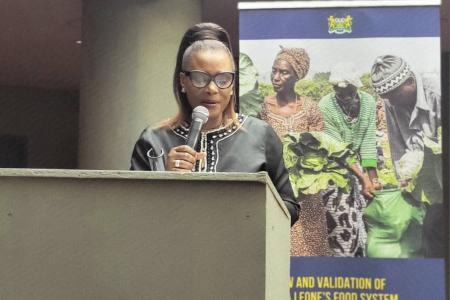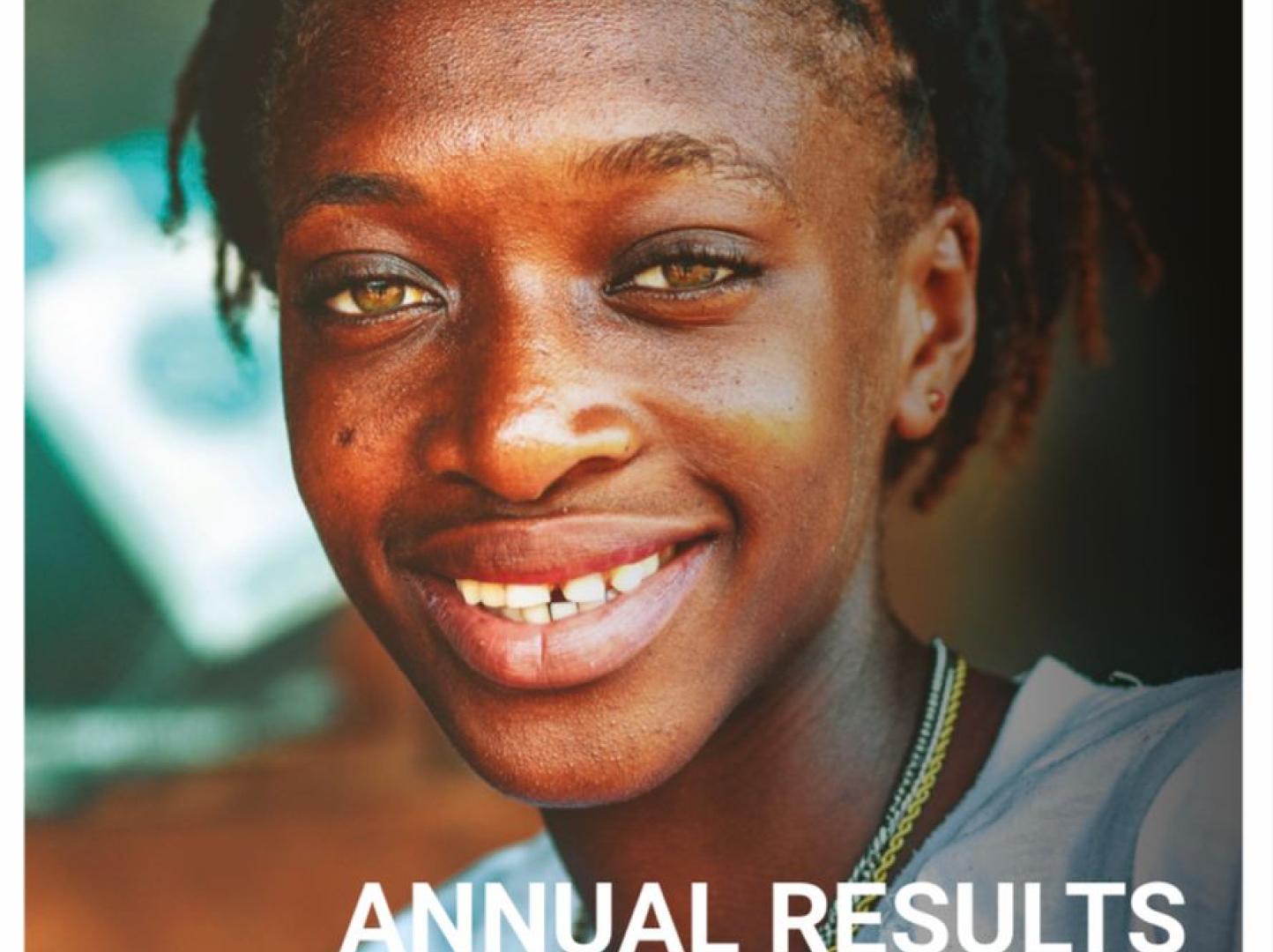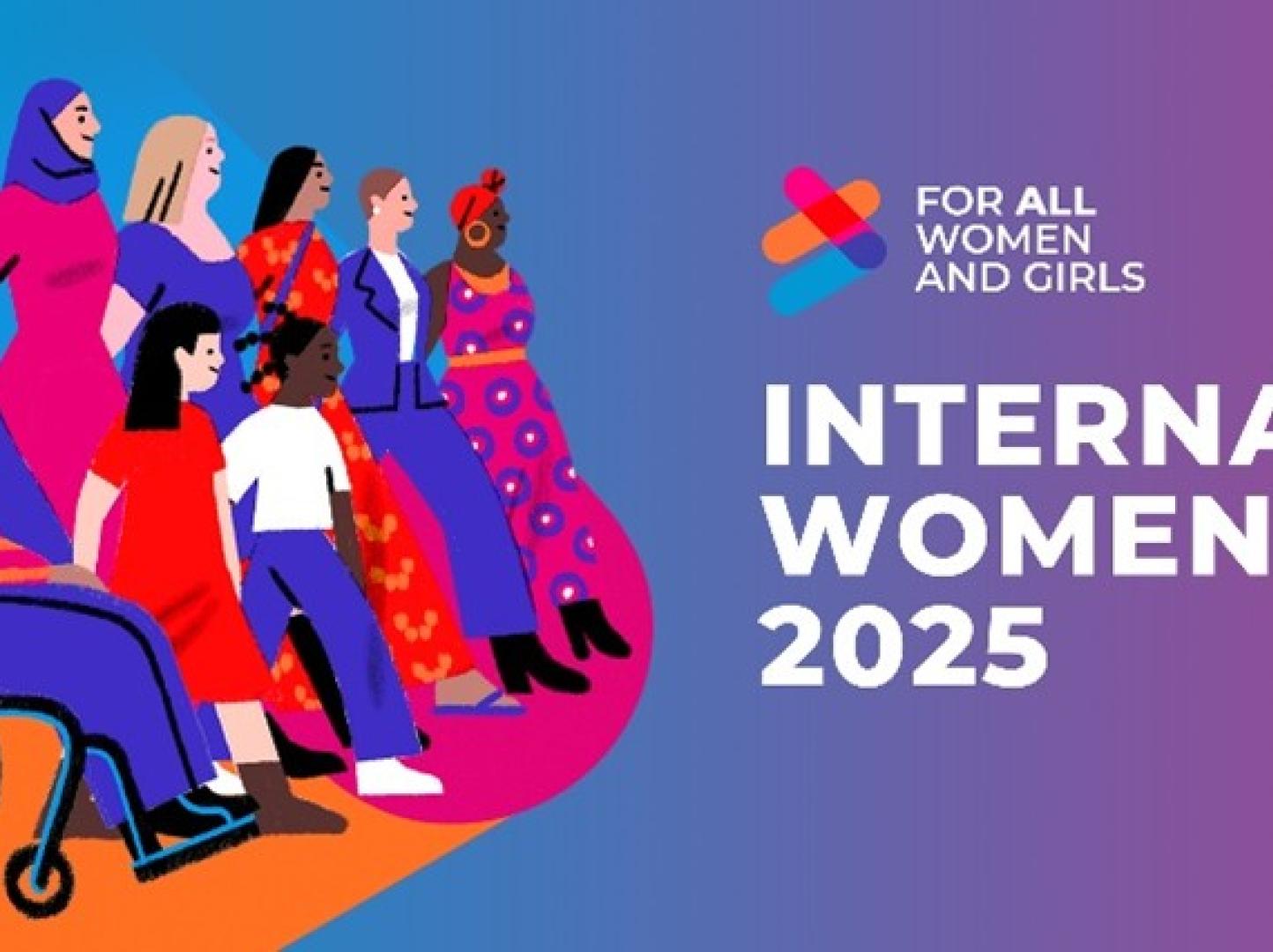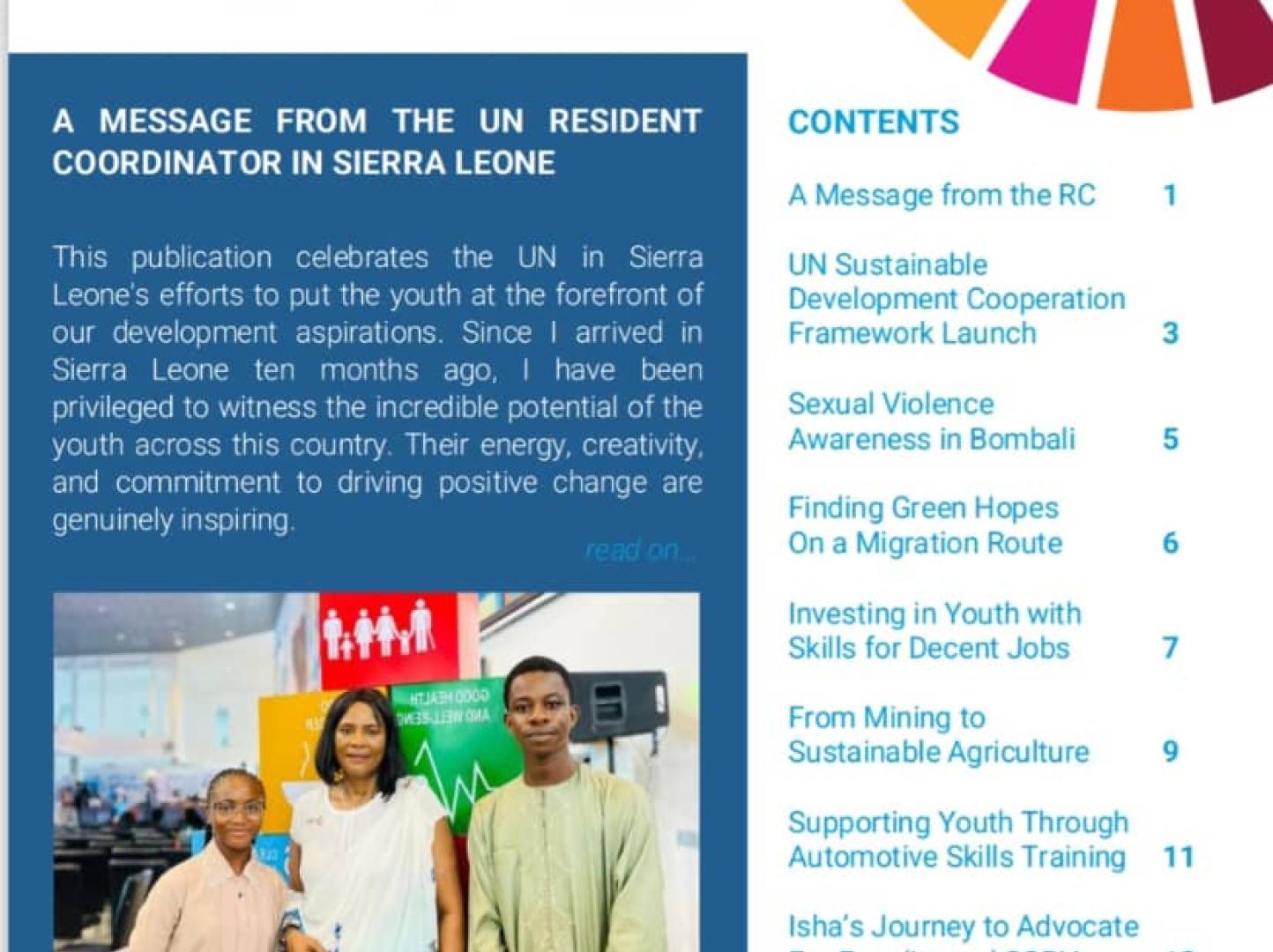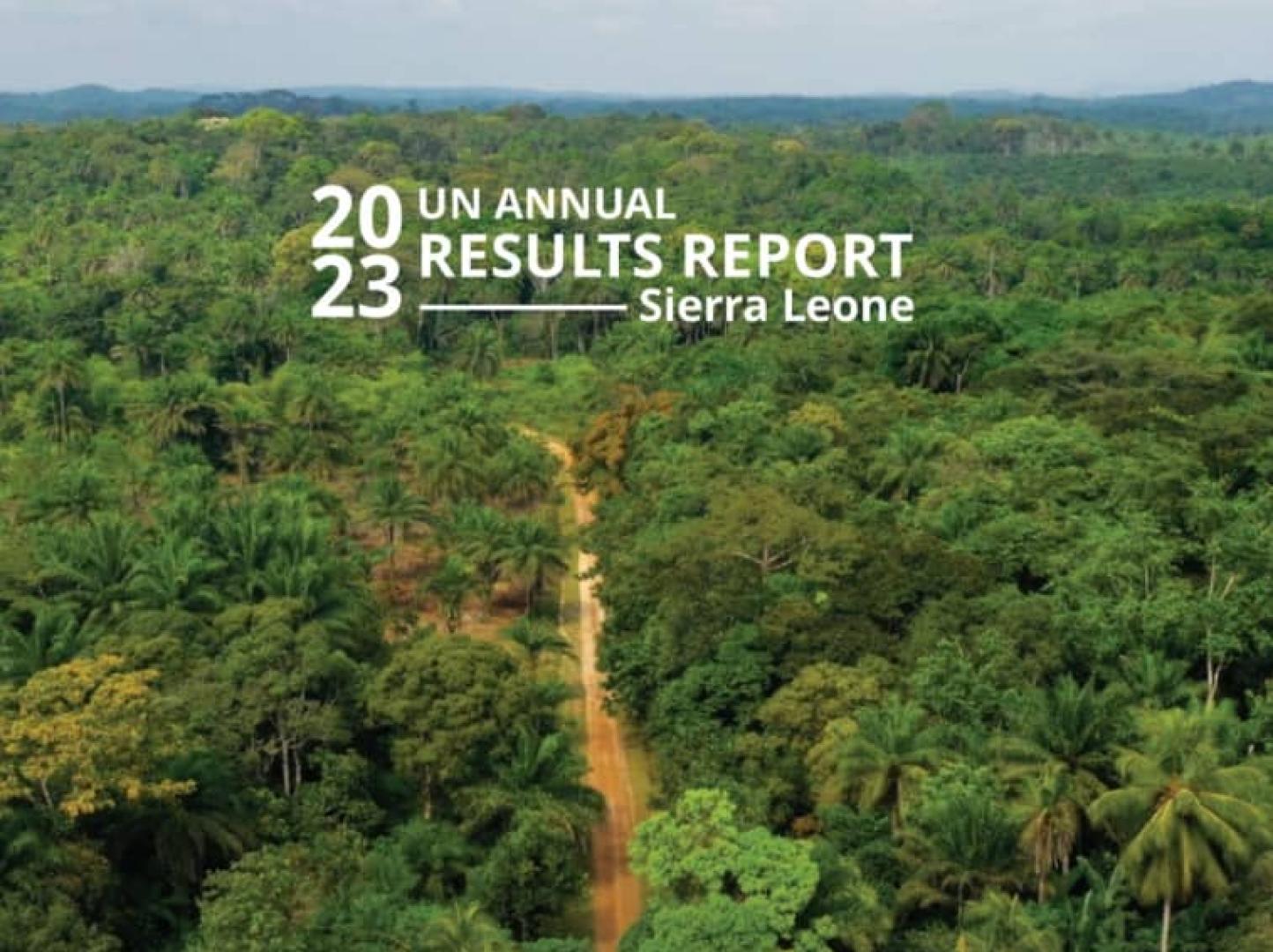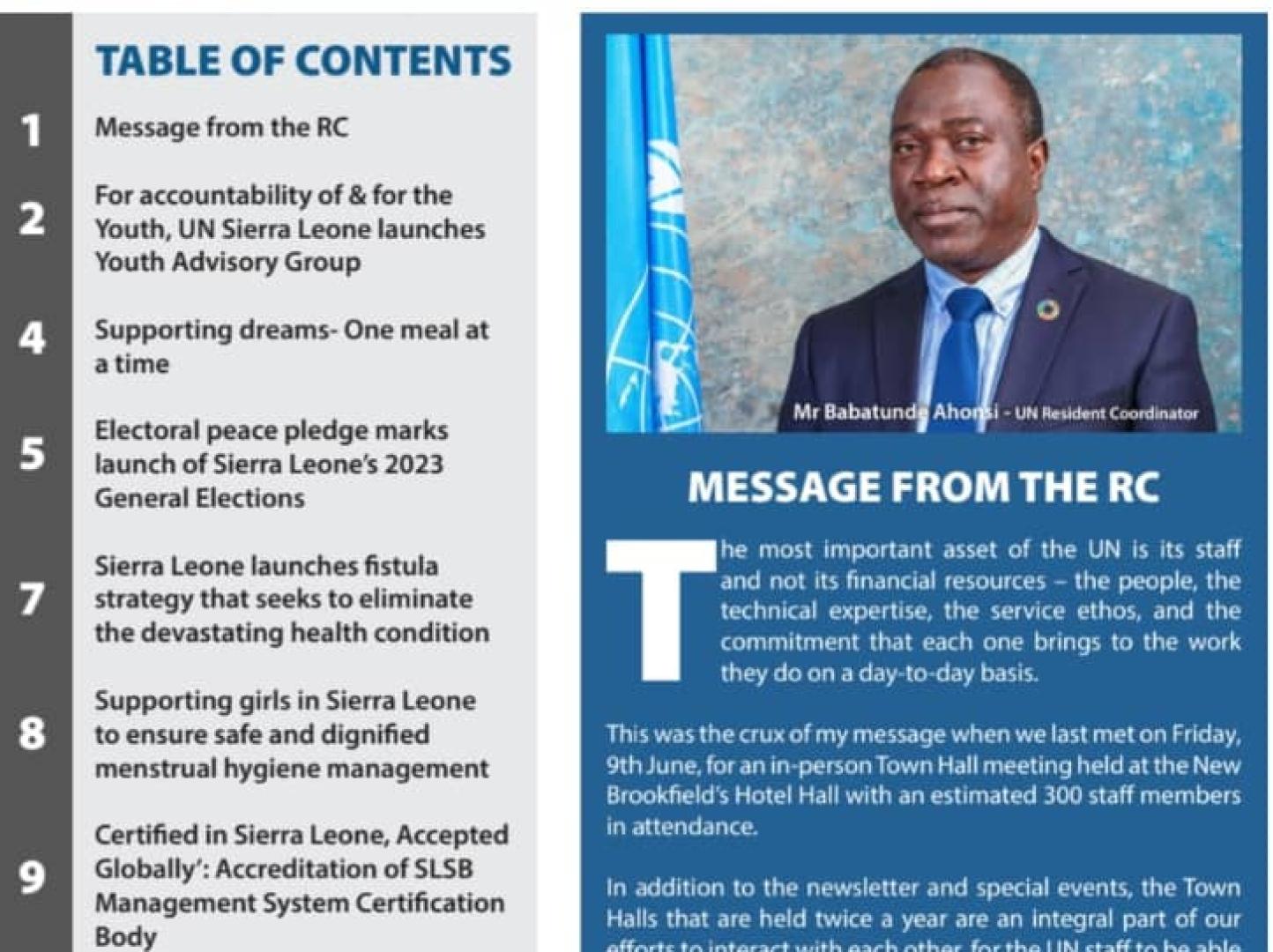Latest
Story
09 July 2025
ITC READY Salone strengthens Innovation Hubs with strategic mapping and training
Learn more
Story
09 July 2025
ITC trains Tech Hub Coaches to support startup growth in Sierra Leone
Learn more
Press Release
08 July 2025
UN Agencies Weekly Highlights - June 30 - July 4
Learn more
Latest
The Sustainable Development Goals in Sierra Leone
The Sustainable Development Goals are a global call to action to end poverty, protect the earth’s environment and climate, and ensure that people everywhere can enjoy peace and prosperity. These are the goals the UN is working on in Sierra Leone:
Story
25 June 2025
UN Resident Coordinator hails Sierra Leone’s strong commitment to Food Systems national and global goals.
UN Resident Coordinator Seraphine Wakana today praised the Government of Sierra Leone for its steadfast commitment to the objectives outlined in the UN Food System Summit, noting that it has been on a journey towards transformational food system change since 2021.She was speaking at the validation workshop on the review of progress against food systems pathways, held at the Radisson Blu Hotel in Freetown by the Sun and Food Systems Coordination Unit in the Office of the Vice President of Sierra Leone. “Over the past five years, Sierra Leone has made noteworthy progress, underscoring the significance of this occasion to review our strides, adjust to rapidly changing contexts, and pinpoint areas for sustained investment and improvement,” the RC said.Madam Wakana recognised the support from UN sister agencies, donors, development partners, academia, and civil society for what she described as a transformational agenda. She emphasised, “We are committed to maintaining this multi-stakeholder approach to comprehensively and inclusively meet the needs of Sierra Leone.” However, from a global context, the RC mentioned that despite commendable efforts, the current food system remains misaligned, failing to serve the impoverished and vulnerable segment of the population. “They fall short of reducing hunger, malnutrition, and diet-related diseases,” she said For her, a robust food systems approach that prioritises value addition, job creation, climate resilience and equitable development is imperative.On behalf of the European Union, Fredrico Capurro expressed gratitude to all the governmental bodies involved in the exercise, to FAO for its extraordinary technical assistance, and to all the other stakeholders for their commitment and support.He said that the presentations to be discussed would be the key to convincing political stakeholders that the money invested in Sierra Leone in the food system sector is not wasted, but they are essential to decrease the rates of food insecurity and malnutrition and important also to create new jobs opportunity in particular for youth through the creation of new enterprises in order to reinforce the agribusiness sector. In her keynote address, the Minister of State in the Office of the Vice President, Manty Tarawalli, stated that food systems encompass more than just what we eat. “They influence our health, our economy, our environment, and the dignity of everyday life. They impact how children grow, how families earn a living, and how communities thrive. Globally, it is now clear that food systems are not just technical challenges. They are deeply structural and political, “she said.The Minister emphasised that the review is about the future and that its findings will shape the country’s contribution to the upcoming UNFSS+4 stock-taking movement next month. It will also guide national decisions on the next phase of food systems transformation.Key findings of the World Food Organisation Sierra Leone Food Security Monitoring System Report of February 2024 indicate that 82 per cent of the population is food insecure, among which 18 per cent of households are severely food insecure.
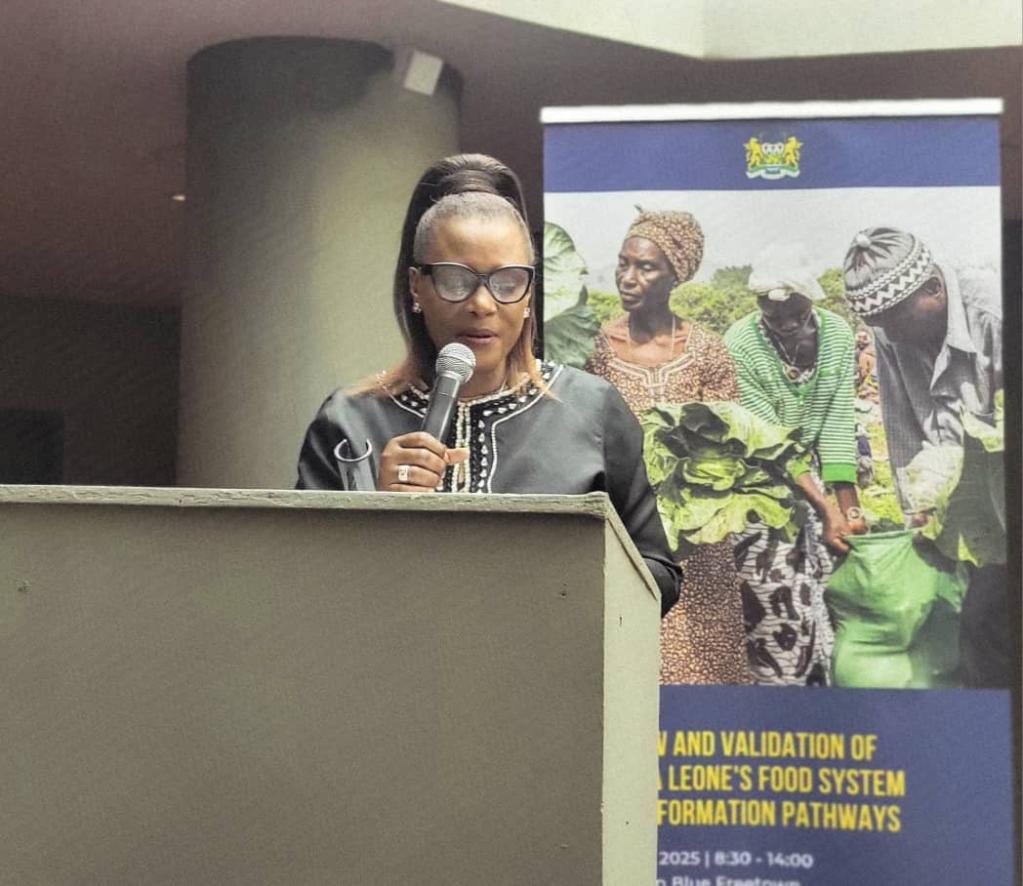
Story
09 July 2025
ITC trains Tech Hub Coaches to support startup growth in Sierra Leone
The International Trade Centre (ITC), under the KOICA-funded READY Salone project, has successfully trained 20 tech hub coaches in the use of the FastTrackTech 360Diagnostics Startup Assessment Tool. The training, held at the IPAM Centre of Excellence in Freetown, equipped participants with the skills to assess startups, identify key strengths and weaknesses, and provide strategic guidance for business growth.The 360Diagnostics Tool is a comprehensive framework that evaluates startups across key business dimensions, including strategy, operations, marketing, and financial management. With this training, the coaches will play a crucial role in helping Sierra Leonean startups conduct self-assessments, interpret diagnostic reports, and implement recommendations to improve their business performance.Led by an international expert, the programme combined theoretical knowledge with hands-on exercises, ensuring participants gained practical experience in conducting assessments and generating diagnostic reports. The curriculum also introduced an early-stage business development framework designed to foster innovation, preparing coaches to support startups both in Freetown and across the regions.Key Outcomes of the Training include proficiency in the FastTrackTech 360Diagnostics tool; ability to guide startups through the assessment process, and skills to structure and deliver actionable insights based on diagnostic reports.Upon Completion, participants gained certification, enhanced expertise in startup assessment tools and methodologies, opportunities to support READY Salone startups in their growth journey, potential contracts to conduct startup assessments, and prospects for future collaboration with ITC and its partner networks.The READY Salone project, funded by KOICA and implemented by ITC, continues to strengthen entrepreneurship and digital transformation in Sierra Leone. By supporting the local startup ecosystem, the project is fostering sustainable economic growth and innovation.
1 of 5
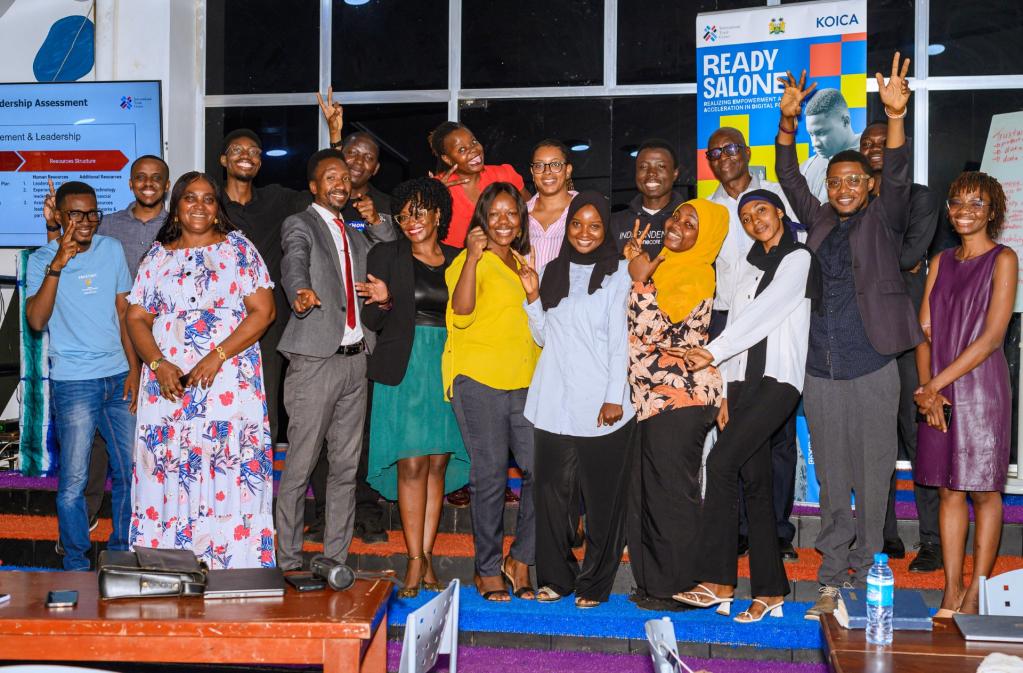
Story
09 July 2025
ITC READY Salone strengthens Innovation Hubs with strategic mapping and training
The International Trade Centre (ITC), through its Republic of Korea-funded READY Salone project, conducted a three-day training and ecosystem mapping exercise for over 23 trainee from 23 trainees from 13 different companies tech businesses and innovation hubs from across Sierra Leone.Held from 6–9 May in Freetown, the training aimed to strengthen the country’s digital and entrepreneurship ecosystem by equipping tech hubs, business support organisations, and ecosystem enablers to: Develop youth-inclusive strategies; Improve service design and delivery, enhance stakeholder engagement, business modelling, and fundraisingParticipants also received the findings of the Entrepreneurship Support Ecosystem Analysis Report, which highlights the current landscape and identifies opportunities for collaboration and innovation.Expert sessions were led by Ms. Tonia Dabwe, with additional insights presented by Nuria Rull Besrainer from ITC Headquarters.This initiative was implemented in partnership with the Ministry of Communication, Technology and Innovation (MOCTI) and the Directorate of Science, Technology and Innovation (DSTI), with support from the Korea International Cooperation Agency (KOICA).
1 of 5
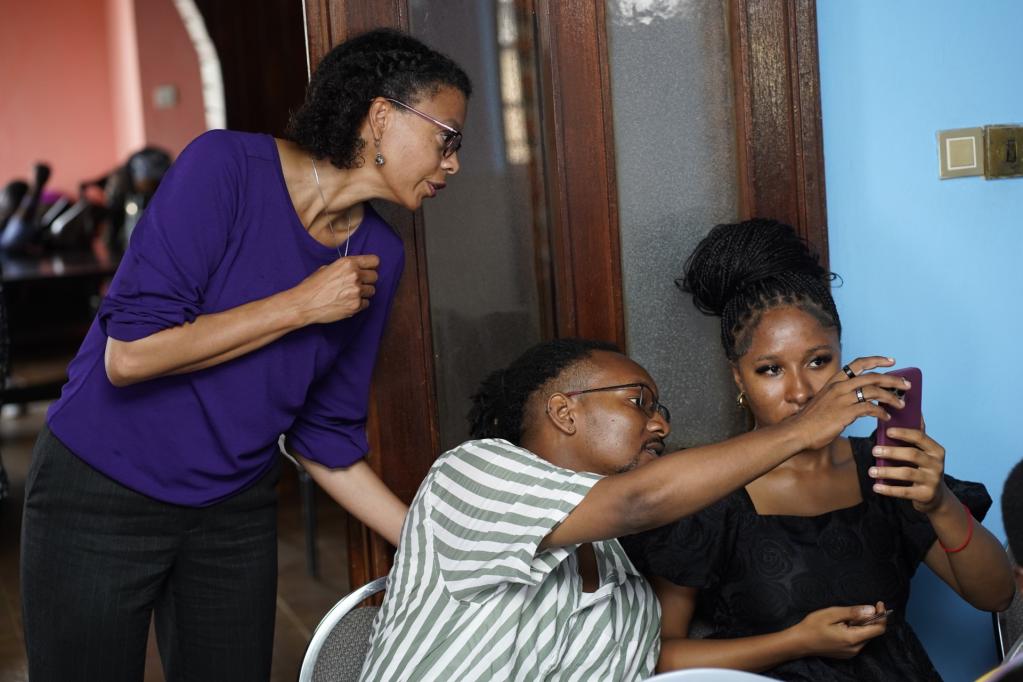
Story
13 May 2025
UNIDO, Sierra Leone and Japan inaugurate Centre of Excellence to drive youth employment in the automotive sector
Freetown, 13 May 2025 - The United Nations Industrial Development Organization (UNIDO), the Government of Sierra Leone, and the Government of Japan today officially inaugurated the Centre of Excellence for Automotive Training at Freetown Polytechnic’s Kissy Campus. The high-level ceremony marks a major milestone in the “Promoting Youth Employment through Automotive Maintenance Skills Training” project, implemented by UNIDO in partnership with the Ministry of Technical and Higher Education and the Ministry of Youth Affairs, and generously funded by the Government of Japan. With youth unemployment and underemployment remaining a persistent challenge in Sierra Leone, the new Centre of Excellence directly addresses the country’s skills gap in the growing automotive sector. Recently renovated and transformed into a state-of-the-art facility that meets international standards, it is now equipped with advanced automotive equipment and tools. The Centre will deliver Sierra Leone’s first nationally accredited, competency-based curriculum in automotive maintenance and entrepreneurship. Developed in consultation with industry experts, the 40-module, 1,000-hour programme is tailored to meet current labor market demands. With an emphasis on hands-on training, it will prepare students for careers in the country’s fast-evolving automotive industry.In his keynote address, David Moinina Sengeh, Honorable Chief Minister of the Government of Sierra Leone, underscored the significance of the initiative:“The Automotive Training Centre we inaugurate today, inspired by the President of Sierra Leone’s 2019 request for support at TICAD Japan, exemplifies our commitment to inclusion, shared prosperity, and human capital development-empowering youth in Sierra Leone and beyond.”Hiroshi Yoshimoto, Ambassador of Japan to Sierra Leone, reaffirmed Japan’s support for the project and for human capital development in Africa: “Japan is honored to support this initiative, which empowers young people and strengthens Sierra Leone’s capacity for economic transformation. Skills development is the key to unlocking opportunity and creating new pathways to prosperity.”Mariatu Abionor Swaray, UNIDO Country Representative, emphasized the project’s role in aligning training with industry needs and creating employment opportunities for youth:
"This Centre reflects strong collaboration between partners to deliver demand-driven training that equips young people with skills matched to industry needs, helping bridge the gap between education and employment."To ensure quality and sustainability, instructors and management staff have completed specialized training both in Sierra Leone and internationally, including in Ghana, Japan, Kenya, South Africa, and Italy. The Centre also features a Career Centre for job matching, business coaching, and apprenticeships, ensuring that training leads to employment and entrepreneurship opportunities.Each year, the Centre can train 200 young automotive mechanics and equip 200 young people with entrepreneurship skills, advancing Sierra Leone’s National Development Goals and the Sustainable Development Agenda. By building a skilled workforce, this initiative supports Sierra Leone’s socio-economic growth while contributing to a more connected and competitive Africa. For further information, please contact:Chie MatsumotoIndustrial Development Expert
"This Centre reflects strong collaboration between partners to deliver demand-driven training that equips young people with skills matched to industry needs, helping bridge the gap between education and employment."To ensure quality and sustainability, instructors and management staff have completed specialized training both in Sierra Leone and internationally, including in Ghana, Japan, Kenya, South Africa, and Italy. The Centre also features a Career Centre for job matching, business coaching, and apprenticeships, ensuring that training leads to employment and entrepreneurship opportunities.Each year, the Centre can train 200 young automotive mechanics and equip 200 young people with entrepreneurship skills, advancing Sierra Leone’s National Development Goals and the Sustainable Development Agenda. By building a skilled workforce, this initiative supports Sierra Leone’s socio-economic growth while contributing to a more connected and competitive Africa. For further information, please contact:Chie MatsumotoIndustrial Development Expert
1 of 5
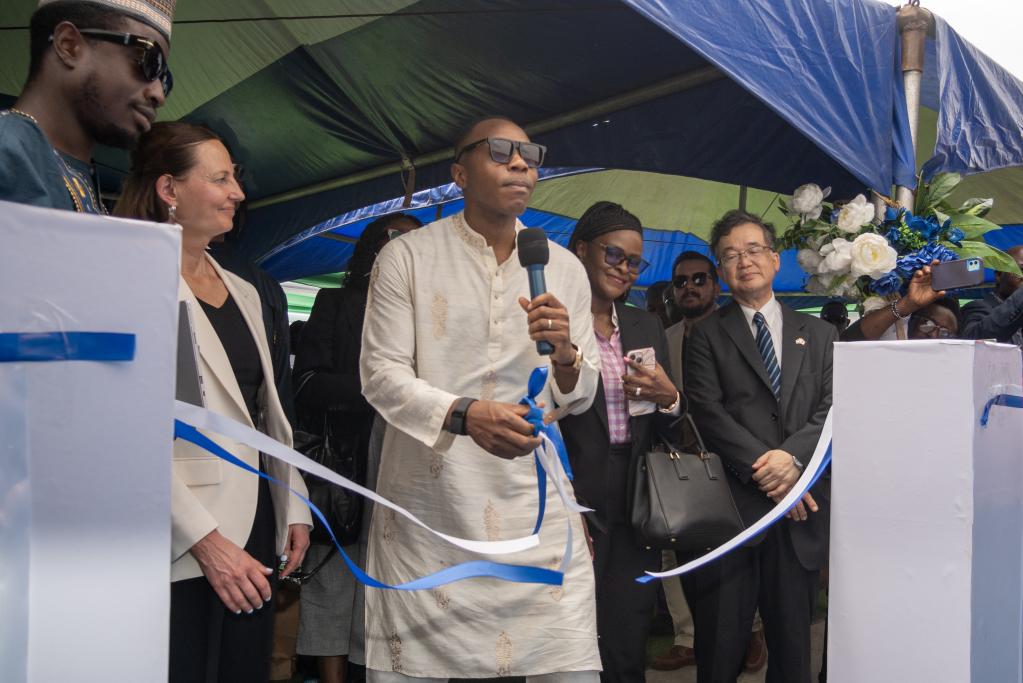
Story
25 April 2025
Conserving the Gola Rainforests: Sierra Leone and Liberia unite for a peaceful future.
The Gola Rainforest, straddling Sierra Leone and Liberia is a lush, green haven. Spanning about 700 square kilometers and stretches across both countries, the rainforest is home to diverse and globally threatened wildlife, including over 300 bird species and endangered species such as pygmy hippos, chimpanzees, and forest elephants.During one of my first visits to the region, as the UN Resident Coordinator in Sierra Leone, I remember being struck by the serene beauty and the abundance of nature all around me.Conserving biodiversity is not just an environmental priority; for both Sierra Leone and Liberia, it is also a peacebuilding strategy between the two countries. A new programme bringing together the two governments, in partnership with the United Nations, called the Resilience, Empowerment, Access and Peacebuilding (GOLA-REAP) project aims to achieve this. The $4 million initiative, funded by the United Nations Secretary-General’s Peacebuilding Fund and led by the International Organization of Migration (IOM) and the World Food Programme (WFP), will work to protect the biodiversity-rich Gola Rainforest while fostering peace and sustainable development.A shared history, a shared futureLiberia and Sierra Leone are more than just neighbors; they share a history of economic cooperation, cultural ties and, regrettably, past conflicts. Both nations endured brutal civil wars in the 1990s and public health crises like the Ebola epidemic of 2014-2015, which claimed tens of thousands of lives. Yet a shared ethnic and cultural heritage means that people on both sides of the Mano River speak the same languages, intermarry and engage in regular cross-border trade. Today, the focus is on development and peacebuilding, forging a sustainable future together. One crucial step toward achieving this goal is ensuring the sustainable management of natural resources. The illegal logging of Gola’s forests not only threatens biodiversity but also disrupts local livelihoods.As UN Resident Coordinators (RCs) on both sides of the border, my colleague Christine N. Umutoni, the UN Resident Coordinator in Liberia and I have had the opportunity to work closely together to help both countries tackle common challenges and find joint solutions. We have continued to work closely with both governments and partners to ensure that the project, which is aligned to the development plans of the two countries, is given the due attention that it deserves. Before the launch, we had extensive engagements with key line ministries, including the Ministry of Planning and Economic Development and local authorities to enhance ownership of the project.Fostering peace through forest managementThe GOLA-REAP project builds on past peacebuilding successes, learning from similar cross-border efforts in 2021-2024 that helped reduce tensions between cattle herders and crop farmers, improve border security, and promote conservation efforts in the Gola region. The initiative will enhance resilience in border communities by promoting sustainable land access, empowering youth and women to prevent and address conflicts related to the use and access of the natural resources and improving forest management. It will provide training on conflict prevention and resolution, community-driven land mapping, and border monitoring for key stakeholders, including local leaders, rangers and border officials. By fostering trust and collaboration, the project will strengthen social cohesion, improve border management and promote sustainable resource use.At the launch event held last month, Ms. Umutoni, and I emphasized the urgent need to curb these destructive activities. Deforestation not only destroys flora and fauna but also eliminates a critical carbon sink that helps mitigate climate change and resulting effects including conflicts around shrinking resources.A solid economic caseBeyond environmental concerns, protecting the Gola Forest makes economic sense. The forest has been validated by the Verified Carbon Standard (VCS) and the Climate, Community, and Biodiversity Alliance (CCBA) as capable of generating carbon credits. Reports indicate that about 19 million tonnes of carbon are stored in Gola Forest, and conservation efforts could help reduce emissions by up to half a million tonnes of carbon dioxide equivalent (CO2e) annually.This presents a viable opportunity for both nations to secure sustainable revenue while combating climate change. Sierra Leone has a unique chance to establish a transparent, credible, and fair carbon market. This market aims to reduce deforestation, support the livelihoods of local and indigenous communities, provide sustainable long-term financing for the country, and contribute to global biodiversity and development commitments on an international level.
In December 2024, RC Umutoni traveled in the opposite direction, from Monrovia to Freetown, and was equally struck by the verdant forests and the aspirations of citizens for a better life. The scars of war are fading, replaced by a collective vision for sustainable development and peace.Long-standing commitmentThe commitment of both countries to conservation is longstanding. In 2009, they pledged to create the Gola Transboundary Peace Park, recognizing the deep connection between conservation, peace and sustainable livelihoods. This commitment was reinforced in 2011 with the signing of a Memorandum of Understanding (MOU) on Gola Forest management, reaffirmed again in 2020.Liberia and Sierra Leone’s commitment to the project underscores the dedication of both countries to fostering peace, resilience, and economic empowerment for their communities. In both countries, the respective Ministries of Internal Affairs are key actors leading the initiative. Further, local authorities, civil society organizations, and community representatives are actively participating in the implementation of the project. This ensures that the initiatives are tailored to the needs and priorities of the communities involved. Getting it right is crucial—not just for the peace and stability of Sierra Leone and Liberia, but for the broader Mano River Union region and Africa as a whole. With strong government leadership, active community participation and ownership, and support from the United Nations and international partners, this unique initiative is well positioned to transform the lives of border communities proving that conservation and peace can indeed go hand in hand—turning Gola’s green heart into a beacon of hope for the region and beyond.This blog has been written by Seraphine Wakana, United Nations Resident Coordinator in Sierra Leone. For more information about the UN's work in Sierra Leone, click here.
Courtesy of the UN Sustainable Development Group, which first published this article on https://unsdg.un.org/latest/stories/conserving-gola-rainforests-sierra-leone-and-liberia-unite-peaceful-future?afd_azwaf_tok=eyJhbGciOiJSUzI1NiJ9.eyJhdWQiOiJ1bnNkZy51bi5vcmciLCJleHAiOjE3NDU1Nzc3MjcsImlhdCI6MTc0NTU3NzcxNywiaXNzIjoidGllcjEtNWQ3NTU3NTc1LWRiNWdjIiwic3ViIjoiNDEuMjIzLjEzNS4zNCIsImRhdGEiOnsidHlwZSI6Imlzc3VlZCIsInJlZiI6IjIwMjUwNDI1VDEwNDE1N1otcjE1ZDc1NTc1NzVkYjVnY2hDMUxJU2dkczQwMDAwMDAwN25nMDAwMDAwMDBieG03IiwiYiI6IjJ4VkgyTGRfR212ZzJzdV9NS2stVzd3QTZubzlxSGlzNGlHOV82bnFaWUEiLCJoIjoiNHVxUl8zNUx2N0tmek50aHVKblMzWlRGUnByRDlYRUliUE10aWpXTzItMCJ9fQ.satJxxRLPZfyrM40JmuxxTKwDgfEdtwrSUp59c1XCawd8Zojr3MssEA-vtbiAS8aSrhRJi-cesiR4bsFJlQ1FipF8PzhmdRvcYQd-ItnEMovvwvQI2aXIm87zxenWP1q2IzHKW2f1fA09DzZPxvxIudi71J-lDMO4nig4JG71faZ7lCbNFULoKoKj_rpO8KFZTOWNFgWTfSCvBKxp2O2m1GF3FIZRw2wlx6cF-pQ4s3W6lFhQvhpUHAznMCaLrQ3nD2KxLIkfeFKf5hhQIhNYdIOnNbweHf3RWzAmHunefoajiLIwk72ATbH2byZh3hCILVodjMmCMbCDj2BKtolfQ.WF3obl2IDtqgvMFRqVdYkD5s
In December 2024, RC Umutoni traveled in the opposite direction, from Monrovia to Freetown, and was equally struck by the verdant forests and the aspirations of citizens for a better life. The scars of war are fading, replaced by a collective vision for sustainable development and peace.Long-standing commitmentThe commitment of both countries to conservation is longstanding. In 2009, they pledged to create the Gola Transboundary Peace Park, recognizing the deep connection between conservation, peace and sustainable livelihoods. This commitment was reinforced in 2011 with the signing of a Memorandum of Understanding (MOU) on Gola Forest management, reaffirmed again in 2020.Liberia and Sierra Leone’s commitment to the project underscores the dedication of both countries to fostering peace, resilience, and economic empowerment for their communities. In both countries, the respective Ministries of Internal Affairs are key actors leading the initiative. Further, local authorities, civil society organizations, and community representatives are actively participating in the implementation of the project. This ensures that the initiatives are tailored to the needs and priorities of the communities involved. Getting it right is crucial—not just for the peace and stability of Sierra Leone and Liberia, but for the broader Mano River Union region and Africa as a whole. With strong government leadership, active community participation and ownership, and support from the United Nations and international partners, this unique initiative is well positioned to transform the lives of border communities proving that conservation and peace can indeed go hand in hand—turning Gola’s green heart into a beacon of hope for the region and beyond.This blog has been written by Seraphine Wakana, United Nations Resident Coordinator in Sierra Leone. For more information about the UN's work in Sierra Leone, click here.
Courtesy of the UN Sustainable Development Group, which first published this article on https://unsdg.un.org/latest/stories/conserving-gola-rainforests-sierra-leone-and-liberia-unite-peaceful-future?afd_azwaf_tok=eyJhbGciOiJSUzI1NiJ9.eyJhdWQiOiJ1bnNkZy51bi5vcmciLCJleHAiOjE3NDU1Nzc3MjcsImlhdCI6MTc0NTU3NzcxNywiaXNzIjoidGllcjEtNWQ3NTU3NTc1LWRiNWdjIiwic3ViIjoiNDEuMjIzLjEzNS4zNCIsImRhdGEiOnsidHlwZSI6Imlzc3VlZCIsInJlZiI6IjIwMjUwNDI1VDEwNDE1N1otcjE1ZDc1NTc1NzVkYjVnY2hDMUxJU2dkczQwMDAwMDAwN25nMDAwMDAwMDBieG03IiwiYiI6IjJ4VkgyTGRfR212ZzJzdV9NS2stVzd3QTZubzlxSGlzNGlHOV82bnFaWUEiLCJoIjoiNHVxUl8zNUx2N0tmek50aHVKblMzWlRGUnByRDlYRUliUE10aWpXTzItMCJ9fQ.satJxxRLPZfyrM40JmuxxTKwDgfEdtwrSUp59c1XCawd8Zojr3MssEA-vtbiAS8aSrhRJi-cesiR4bsFJlQ1FipF8PzhmdRvcYQd-ItnEMovvwvQI2aXIm87zxenWP1q2IzHKW2f1fA09DzZPxvxIudi71J-lDMO4nig4JG71faZ7lCbNFULoKoKj_rpO8KFZTOWNFgWTfSCvBKxp2O2m1GF3FIZRw2wlx6cF-pQ4s3W6lFhQvhpUHAznMCaLrQ3nD2KxLIkfeFKf5hhQIhNYdIOnNbweHf3RWzAmHunefoajiLIwk72ATbH2byZh3hCILVodjMmCMbCDj2BKtolfQ.WF3obl2IDtqgvMFRqVdYkD5s
1 of 5
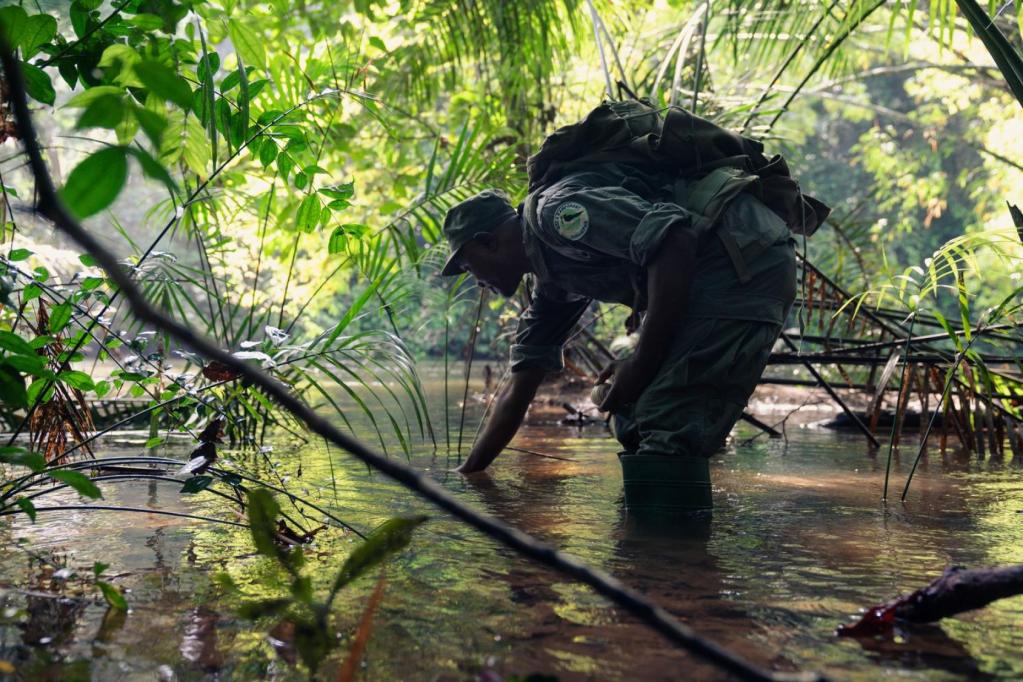
Story
25 April 2025
National Conference advances inclusive financing for women, peace and security in Sierra Leone.
A three-day national conference on financing for Women, Peace, and Security (WPS) has taken place in Freetown, uniting women peacebuilders, entrepreneurs, civil society organisations, and innovators. Jointly organised by UNDP, UN Women, World Vision, and the Ministry of Gender and Children’s Affairs, the event, held under the theme “Pathways to Inclusive Financing for Women, Peace and Security seeks to develop sustainable solutions for financing women-led peacebuilding initiatives.The conference is part of the UN Peacebuilding Fund's "Localisation and Working for Peace" project, which empowers women-led CSOs to strengthen peace efforts and enhance safety for women and girls across Sierra Leone.Despite representing more than half of the population, women in Sierra Leone face significant barriers to financial inclusion. Since adopting its first National Action Plan (NAP) on UNSCR 1325 in 2009, the country has made strides, including enacting key legislative reforms such as the GEWE Act (2022) and the Abolition of Child Marriage Act (2024). However, implementation challenges remain.UN Resident Coordinator Saraphine Wakana called women as the “architects of peace,” urging all stakeholders to translate policies into real, inclusive action. Minister of Gender and Children’s Affairs, Dr. Isata Mahoi, emphasised the urgency of closing financing gaps to fully realise the WPS agenda.Discussions focused on innovative financing models, including a proposed women’s bank, local farmers’ markets, and public-private partnerships positioning women as co-investors as well as development partners support.
1 of 5
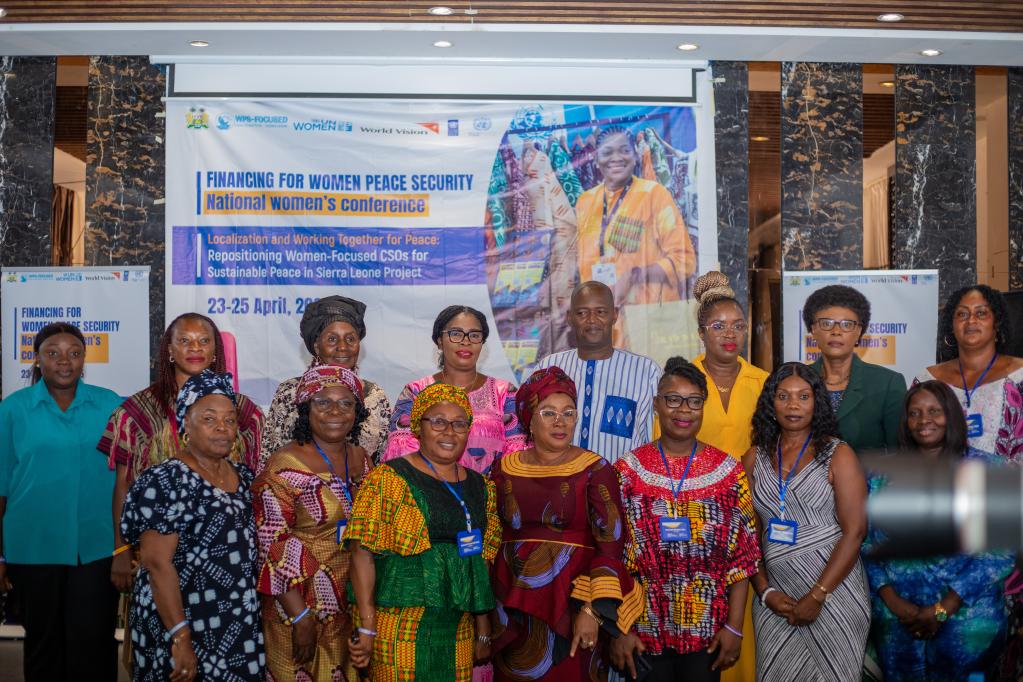
Press Release
08 July 2025
UN Agencies Weekly Highlights - June 30 - July 4
WFP
Building readiness: NDMA, WFP, SLRCS and partners strengthen Sierra Leone’s emergency response capacity.
To strengthen national capacity for effective disaster response, the National Disaster Management Agency (NDMA), in collaboration with the World Food Programme (WFP) and the Sierra Leone Red Cross Society, organized a three-day nationwide emergency preparedness and response workshop. The training aimed to improve coordination and readiness among key disaster management actors and included practical simulations to enhance operational capabilities during crises. In his opening remarks, Mr. John Rogers, Deputy Director General of NDMA, provided a sobering overview of recent disasters in Sierra Leone. He emphasized that the adverse impacts of these events could have been significantly mitigated through adequate preparedness and readiness. Mr. Rogers underscored that the primary aim of the workshop was to strengthen the operational readiness of responders for more effective disaster management. He called on all stakeholders to shift the focus from reactive disaster response to proactive preparedness. He noted that selected partners were chosen based on their critical roles in disaster risk reduction. Key issues he highlighted included: The urgent need for inter-pillar coordination, which he noted has often been lacking.The critical role of early warning systems in improving preparedness.The importance of effective disaster communication. The workshop emphasised preparedness over response, promoting coordinated action, and data-driven planning. Key takeaways include the validation of Terms of Reference of response pillars, a shared understanding of national response strategies, and improved readiness tools such as the rapid assessment framework. The simulation exercise underscored the value of continuous testing and improvement of emergency plans to build a more resilient disaster management system in Sierra Leone.
UNICEF
With support from UNICEF, Sierra Leone launched a National Life Skills Framework to empower adolescents.
UNICEF, in collaboration with the Ministry of Basic and Senior Secondary Education (MBSSE) and other development partners, on Wednesday, 2nd July, launched a Comprehensive Life Skills Framework which is a significant milestone in efforts to strengthen the relevance and impacts of education for young people. The new framework is a forward-looking policy tool that integrates essential life skills—such as critical thinking, emotional resilience, problem-solving, teamwork, and empathy—into the national education system. It aims to ensure that every child in Sierra Leone is equipped not only with academic knowledge, but also with the personal and social skills necessary to navigate life, work, and society in an increasingly complex world. The framework was developed through a collaborative and consultative process involving government agencies, teachers, students, civil society organizations, and development partners. It is aligned with Sierra Leone’s national development objectives and global commitments, including Sustainable Development Goal 4 on inclusive and equitable quality education. “This is a critical step forward and by embedding life skills in the senior secondary curriculum, Sierra Leone is investing in the full potential of adolescents and laying the foundation for a more resilient and inclusive generation,” said Liv Elin Indreiten, Acting UNICEF Representative in Sierra Leone. “UNICEF congratulates the MBSSE for its leadership and is proud to have supported this process. We call on all partners to work together to ensure its full and effective implementation.”
UNFPA
UNFPA joins African feminist leaders at the 4th NALAFEM Summit.
From 1-2 July, UNFPA joined changemakers, feminist leaders, and survivors at the 4th NALAFEM Summit held under the theme “From Representation to Power: Women Leading in Crisis & Peace.” In a powerful video message during the Opening Ceremony, UNFPA Executive Director Dr. Natalia Kanem reaffirmed UNFPA’s global commitment to advancing reproductive rights, gender equality, peace, and women’s leadership in crisis settings.
In the panel “From the Margins to Leadership,” UNFPA Sierra Leone’s Officer-in-Charge, Ms. Sibeso Mululuma, emphasised that the agency’s work is grounded in the lived experiences of survivors. From prevention to recovery, we ensure survivors are not only heard but lead the way in shaping responses to gender-based violence and harmful practices.
Building readiness: NDMA, WFP, SLRCS and partners strengthen Sierra Leone’s emergency response capacity.
To strengthen national capacity for effective disaster response, the National Disaster Management Agency (NDMA), in collaboration with the World Food Programme (WFP) and the Sierra Leone Red Cross Society, organized a three-day nationwide emergency preparedness and response workshop. The training aimed to improve coordination and readiness among key disaster management actors and included practical simulations to enhance operational capabilities during crises. In his opening remarks, Mr. John Rogers, Deputy Director General of NDMA, provided a sobering overview of recent disasters in Sierra Leone. He emphasized that the adverse impacts of these events could have been significantly mitigated through adequate preparedness and readiness. Mr. Rogers underscored that the primary aim of the workshop was to strengthen the operational readiness of responders for more effective disaster management. He called on all stakeholders to shift the focus from reactive disaster response to proactive preparedness. He noted that selected partners were chosen based on their critical roles in disaster risk reduction. Key issues he highlighted included: The urgent need for inter-pillar coordination, which he noted has often been lacking.The critical role of early warning systems in improving preparedness.The importance of effective disaster communication. The workshop emphasised preparedness over response, promoting coordinated action, and data-driven planning. Key takeaways include the validation of Terms of Reference of response pillars, a shared understanding of national response strategies, and improved readiness tools such as the rapid assessment framework. The simulation exercise underscored the value of continuous testing and improvement of emergency plans to build a more resilient disaster management system in Sierra Leone.
UNICEF
With support from UNICEF, Sierra Leone launched a National Life Skills Framework to empower adolescents.
UNICEF, in collaboration with the Ministry of Basic and Senior Secondary Education (MBSSE) and other development partners, on Wednesday, 2nd July, launched a Comprehensive Life Skills Framework which is a significant milestone in efforts to strengthen the relevance and impacts of education for young people. The new framework is a forward-looking policy tool that integrates essential life skills—such as critical thinking, emotional resilience, problem-solving, teamwork, and empathy—into the national education system. It aims to ensure that every child in Sierra Leone is equipped not only with academic knowledge, but also with the personal and social skills necessary to navigate life, work, and society in an increasingly complex world. The framework was developed through a collaborative and consultative process involving government agencies, teachers, students, civil society organizations, and development partners. It is aligned with Sierra Leone’s national development objectives and global commitments, including Sustainable Development Goal 4 on inclusive and equitable quality education. “This is a critical step forward and by embedding life skills in the senior secondary curriculum, Sierra Leone is investing in the full potential of adolescents and laying the foundation for a more resilient and inclusive generation,” said Liv Elin Indreiten, Acting UNICEF Representative in Sierra Leone. “UNICEF congratulates the MBSSE for its leadership and is proud to have supported this process. We call on all partners to work together to ensure its full and effective implementation.”
UNFPA
UNFPA joins African feminist leaders at the 4th NALAFEM Summit.
From 1-2 July, UNFPA joined changemakers, feminist leaders, and survivors at the 4th NALAFEM Summit held under the theme “From Representation to Power: Women Leading in Crisis & Peace.” In a powerful video message during the Opening Ceremony, UNFPA Executive Director Dr. Natalia Kanem reaffirmed UNFPA’s global commitment to advancing reproductive rights, gender equality, peace, and women’s leadership in crisis settings.
In the panel “From the Margins to Leadership,” UNFPA Sierra Leone’s Officer-in-Charge, Ms. Sibeso Mululuma, emphasised that the agency’s work is grounded in the lived experiences of survivors. From prevention to recovery, we ensure survivors are not only heard but lead the way in shaping responses to gender-based violence and harmful practices.
1 of 5
Press Release
23 June 2025
UN Agencies Weekly Highlights- June 16-June 20
United Nations Sierra Leone
UNICEF
Fighting mpox: UNICEF scales up critical support in Sierra Leone
As the Sierra Leone Government battles the third Mpox outbreak in the country, UNICEF is stepping up with comprehensive action to safeguard communities and support the acceleration of the national response. In close partnership with the Government, the Ministry of Health, the National Public Health Agency, and global partners, UNICEF is driving critical interventions to curb the spread of Mpox. Sierra Leone is facing its third Mpox outbreak, officially declared on 13 January 2025 after the first case was confirmed on 10 January. As of 17 June, there have been over 4000 confirmed cases and 25 deaths, with most patients recovering. The outbreak mainly affects people aged 20–39, especially women aged 20–29, and is concentrated in the Western district. “This Mpox outbreak is a stark reminder of how quickly lives can be disrupted, especially for the most vulnerable — children and families,” said Rudolf Schwenk, UNICEF Representative in Sierra Leone. “UNICEF is working with the Government and partners to deliver urgent support — from vaccines and safe water to trusted information and psychosocial support — so that communities can stay safe, informed, and resilient.” With over $600,000 already invested, UNICEF is driving Mpox prevention and control efforts across Sierra Leone through risk communication, WASH improvements, education, child protection, and vaccination initiatives.
WHO WHO convenes high-level meeting to bolster Sierra Leone’s mpox response
Freetown, Sierra Leone –The World Health Organization (WHO) convened a high-level meeting in Freetown to update key partners on Sierra Leone’s national response to the ongoing mpox outbreak and to mobilize coordinated support to address critical gaps. Chaired by Ambassador Jens Kraus-Mass, Dean of the Diplomatic Corps, the meeting brought together 20 strategic stakeholders including the Honourable Minister of Health, Dr. Austin Demby, the Head of the National Public Health Agency (NPHA), Prof. Foday Sahr, ECOWAS representatives, ambassadors, and development partners. Since confirming its first case in January 2025, Sierra Leone has recorded 4,181 confirmed mpox cases across all 16 districts. While the recent decline in new infections, 1,168 over the past three weeks signals progress, urgent action is needed to sustain the response. Minister Demby thanked WHO and partners for their solidarity, emphasizing the importance of evidence-based action: “This is a learning opportunity. We will build capacity and strengthen institutions, ensuring everything we do is guided by science.” Key progress reported includes expanded testing capacity, vaccination of healthcare workers and at-risk groups, enhanced community outreach, and targeted training in infection prevention and control (IPC). Yet, challenges persist, particularly in surveillance, genomic sequencing, psychosocial support, and IPC supply chains. “The next three weeks are crucial,” said WHO Country Representative Dr. George Ameh. “Maintaining momentum is essential to preserve gains and prevent resurgence.” With young adults aged 20–39, especially females 20–29, most affected, stakeholders called for deeper behavioural analysis and targeted interventions. Ambassador Kraus-Mass affirmed continued diplomatic support: “We are rethinking our approach to ensure we close gaps and support Sierra Leone more effectively.” The meeting underscored the power of coordinated action and reaffirmed commitment to halting transmission, protecting communities, and strengthening long-term health systems. UNDP UNDP hands over community facilities to strengthen local security in Kono District
In a significant step towards strengthening community safety, accountability, and resilience, the United Nations Development Programme (UNDP), in partnership with the Food and Agriculture Organization (FAO), have officially handed over newly constructed Local Police Partnership Board (LPPB) offices to stakeholders in Soa, Gbense, and Kamara chiefdoms in Kono District. This milestone marks a key achievement under the Human Security Project, jointly implemented by UNDP and FAO and funded by the UN Trust Fund for Human Security (UNTFHS). The initiative applied the Human Security Approach to address the interlinked vulnerabilities faced by rural communities, ranging from conflict recovery and environmental degradation to weak governance and economic Exclusion. “These new facilities are more than just buildings, they symbolize community trust, local ownership, and our collective commitment to building peaceful and resilient societies. We are proud to stand with the people of Kono District in advancing sustainable development and inclusive security,” said Fredrick Ampiah , UNDP, Resident Representative. The targeted chiefdoms of Soa, Gbense, and Kamara, rich in mineral resources but historically underserved, have faced the lasting impacts of Sierra Leone’s civil conflict, harmful mining practices, and limited infrastructure. Through this joint project, UNDP, focused on strengthening community governance, conflict resolution, early warning systems, and social inclusion. FAO promoted climate-resilient agriculture, sustainable farming practices, and improved food security. The new LPPB offices will serve as community hubs for mediation, early response to conflict, and collaboration between citizens and local law enforcement.
UNICEF
Fighting mpox: UNICEF scales up critical support in Sierra Leone
As the Sierra Leone Government battles the third Mpox outbreak in the country, UNICEF is stepping up with comprehensive action to safeguard communities and support the acceleration of the national response. In close partnership with the Government, the Ministry of Health, the National Public Health Agency, and global partners, UNICEF is driving critical interventions to curb the spread of Mpox. Sierra Leone is facing its third Mpox outbreak, officially declared on 13 January 2025 after the first case was confirmed on 10 January. As of 17 June, there have been over 4000 confirmed cases and 25 deaths, with most patients recovering. The outbreak mainly affects people aged 20–39, especially women aged 20–29, and is concentrated in the Western district. “This Mpox outbreak is a stark reminder of how quickly lives can be disrupted, especially for the most vulnerable — children and families,” said Rudolf Schwenk, UNICEF Representative in Sierra Leone. “UNICEF is working with the Government and partners to deliver urgent support — from vaccines and safe water to trusted information and psychosocial support — so that communities can stay safe, informed, and resilient.” With over $600,000 already invested, UNICEF is driving Mpox prevention and control efforts across Sierra Leone through risk communication, WASH improvements, education, child protection, and vaccination initiatives.
WHO WHO convenes high-level meeting to bolster Sierra Leone’s mpox response
Freetown, Sierra Leone –The World Health Organization (WHO) convened a high-level meeting in Freetown to update key partners on Sierra Leone’s national response to the ongoing mpox outbreak and to mobilize coordinated support to address critical gaps. Chaired by Ambassador Jens Kraus-Mass, Dean of the Diplomatic Corps, the meeting brought together 20 strategic stakeholders including the Honourable Minister of Health, Dr. Austin Demby, the Head of the National Public Health Agency (NPHA), Prof. Foday Sahr, ECOWAS representatives, ambassadors, and development partners. Since confirming its first case in January 2025, Sierra Leone has recorded 4,181 confirmed mpox cases across all 16 districts. While the recent decline in new infections, 1,168 over the past three weeks signals progress, urgent action is needed to sustain the response. Minister Demby thanked WHO and partners for their solidarity, emphasizing the importance of evidence-based action: “This is a learning opportunity. We will build capacity and strengthen institutions, ensuring everything we do is guided by science.” Key progress reported includes expanded testing capacity, vaccination of healthcare workers and at-risk groups, enhanced community outreach, and targeted training in infection prevention and control (IPC). Yet, challenges persist, particularly in surveillance, genomic sequencing, psychosocial support, and IPC supply chains. “The next three weeks are crucial,” said WHO Country Representative Dr. George Ameh. “Maintaining momentum is essential to preserve gains and prevent resurgence.” With young adults aged 20–39, especially females 20–29, most affected, stakeholders called for deeper behavioural analysis and targeted interventions. Ambassador Kraus-Mass affirmed continued diplomatic support: “We are rethinking our approach to ensure we close gaps and support Sierra Leone more effectively.” The meeting underscored the power of coordinated action and reaffirmed commitment to halting transmission, protecting communities, and strengthening long-term health systems. UNDP UNDP hands over community facilities to strengthen local security in Kono District
In a significant step towards strengthening community safety, accountability, and resilience, the United Nations Development Programme (UNDP), in partnership with the Food and Agriculture Organization (FAO), have officially handed over newly constructed Local Police Partnership Board (LPPB) offices to stakeholders in Soa, Gbense, and Kamara chiefdoms in Kono District. This milestone marks a key achievement under the Human Security Project, jointly implemented by UNDP and FAO and funded by the UN Trust Fund for Human Security (UNTFHS). The initiative applied the Human Security Approach to address the interlinked vulnerabilities faced by rural communities, ranging from conflict recovery and environmental degradation to weak governance and economic Exclusion. “These new facilities are more than just buildings, they symbolize community trust, local ownership, and our collective commitment to building peaceful and resilient societies. We are proud to stand with the people of Kono District in advancing sustainable development and inclusive security,” said Fredrick Ampiah , UNDP, Resident Representative. The targeted chiefdoms of Soa, Gbense, and Kamara, rich in mineral resources but historically underserved, have faced the lasting impacts of Sierra Leone’s civil conflict, harmful mining practices, and limited infrastructure. Through this joint project, UNDP, focused on strengthening community governance, conflict resolution, early warning systems, and social inclusion. FAO promoted climate-resilient agriculture, sustainable farming practices, and improved food security. The new LPPB offices will serve as community hubs for mediation, early response to conflict, and collaboration between citizens and local law enforcement.
1 of 5
Press Release
27 May 2025
UN Agencies Weekly Highlights- May 19-May 23
RCORCO convenes three-day UNCT Annual Retreat 2025 at Bintumani Hotel The Resident Coordinator’s Office (RCO) convened the 2025 UN Country Team (UNCT) Annual Retreat on 21 May at the Bintumani Hotel under the theme, “Strategic Repositioning for Impact – Fostering Innovative Partnerships, Enhancing Internal Efficiency, and Promoting Staff Well-being to Accelerate SDG Delivery in Sierra Leone.” The retreat opened at a pivotal moment, as 2025 marks the first year of implementing the new United Nations Sustainable Development Cooperation Framework (CF 2025–2030), aligned with the country’s Medium-Term National Development Plan. In her opening remarks, UN Resident Coordinator Ms. Seraphine Wakana underscored the urgency of strategic repositioning in light of shifting development financing and geopolitical realities. She emphasised the importance of innovative partnerships, including private sector and South-South cooperation, as key to unlocking sustainable financing streams. Ms. Wakana also reaffirmed the UNCT’s role in strengthening joint programming, improving internal efficiencies, and advancing staff well-being within the broader UN 2.0 and UN80 reform agendas. She called on the UN system to move forward not as isolated entities, but as one UN family, united in purpose, responsive to national priorities, and committed to delivering on the promises made through the Cooperation Framework.
WFP Solar-Powered Cold Storage Set to Transform Lives of Women Farmers in Sierra Leone
On May 14, 2025, in Newton, Western Area Rural, the Embassy of Japan joined WFP and the Ministry of Agriculture and Food Security to launch a solar-powered cold storage facility—the first of its kind in Sierra Leone. The innovation, funded by Japan and implemented by WFP with MAFS, is set to revolutionize post-harvest storage for women vegetable farmers by reducing spoilage and opening new markets.For years, smallholder women farmers in Koinadugu have struggled with post-harvest losses. Now, with this facility piloted by the Koinadugu Women Vegetable Farmers’ Cooperative, they can store vegetables longer and sell at better prices.“Before this, we lost almost half of our vegetables,” said Haja Sondu Marah. “Now, we can keep them fresh for days, even weeks.”WFP’s Yvonne Forsén called it “a step toward economic justice,” while Ambassador Yoshimoto Hiroshi reaffirmed Japan’s support for sustainable development. Deputy Minister Dr. Theresa Tenneh-Dick praised the project for building long-term resilience.
IOM
IOM Sierra Leone Chief Holds High-Level Talks to Strengthen Migration Governance and Partnerships
This week, Madame Aissata Kane, IOM Sierra Leone Chief of Mission with Coordinating Functions based in Dakar, held high-level bilateral meetings with key partners including the Government of Sierra Leone, the European Union, and the UN Resident Coordinator a.i. Discussions focused on deepening collaboration on migration governance, aligning priorities, and identifying joint initiatives. Meetings with senior officials from the Ministries of Youth and Foreign Affairs reinforced commitment to a whole-of-government and whole-of-society approach to migration management.
UNDPUNDP brings solar light to over 2,000 rural households in Sierra Leone
In a significant stride toward expanding clean energy access, the United Nations Development Programme (UNDP) has launched the installation of solar lighting systems for 2,183 rural households across six districts in Sierra Leone: Falaba, Kambia, Moyamba, Pujehun, Bonthe, and the Western Area (Rural) Districts. Each household will receive a 12-watt solar home system equipped with lighting units and mobile phone charging ports. This initiative aims to improve the quality of life, particularly for women and their families, in communities with limited or no electricity. The systems are expected to enhance household safety, extend study hours for children, and increase productivity for women-led small businesses. "This intervention is about more than just light, it's about empowerment, dignity, and opportunity,” said Mr. Fredrick Ampiah, UNDP Resident Representative. “By targeting female-led households, we are advancing gender equality and supporting resilient communities.” The solar installations align with UNDP’s broader strategy for inclusive energy access and climate resilience, directly contributing to the Sustainable Development Goals, particularly SDG 7 (Affordable and Clean Energy) and SDG 5 (Gender Equality). Selected communities were chosen based on existing or planned UNDP interventions, enabling the programme to build on established infrastructure and partnerships. This area-based approach ensures more efficient delivery and deeper impact. With solar installations underway in Tombo, residents are hopeful, seeing not just light, but new opportunities and a brighter future.
WFP Solar-Powered Cold Storage Set to Transform Lives of Women Farmers in Sierra Leone
On May 14, 2025, in Newton, Western Area Rural, the Embassy of Japan joined WFP and the Ministry of Agriculture and Food Security to launch a solar-powered cold storage facility—the first of its kind in Sierra Leone. The innovation, funded by Japan and implemented by WFP with MAFS, is set to revolutionize post-harvest storage for women vegetable farmers by reducing spoilage and opening new markets.For years, smallholder women farmers in Koinadugu have struggled with post-harvest losses. Now, with this facility piloted by the Koinadugu Women Vegetable Farmers’ Cooperative, they can store vegetables longer and sell at better prices.“Before this, we lost almost half of our vegetables,” said Haja Sondu Marah. “Now, we can keep them fresh for days, even weeks.”WFP’s Yvonne Forsén called it “a step toward economic justice,” while Ambassador Yoshimoto Hiroshi reaffirmed Japan’s support for sustainable development. Deputy Minister Dr. Theresa Tenneh-Dick praised the project for building long-term resilience.
IOM
IOM Sierra Leone Chief Holds High-Level Talks to Strengthen Migration Governance and Partnerships
This week, Madame Aissata Kane, IOM Sierra Leone Chief of Mission with Coordinating Functions based in Dakar, held high-level bilateral meetings with key partners including the Government of Sierra Leone, the European Union, and the UN Resident Coordinator a.i. Discussions focused on deepening collaboration on migration governance, aligning priorities, and identifying joint initiatives. Meetings with senior officials from the Ministries of Youth and Foreign Affairs reinforced commitment to a whole-of-government and whole-of-society approach to migration management.
UNDPUNDP brings solar light to over 2,000 rural households in Sierra Leone
In a significant stride toward expanding clean energy access, the United Nations Development Programme (UNDP) has launched the installation of solar lighting systems for 2,183 rural households across six districts in Sierra Leone: Falaba, Kambia, Moyamba, Pujehun, Bonthe, and the Western Area (Rural) Districts. Each household will receive a 12-watt solar home system equipped with lighting units and mobile phone charging ports. This initiative aims to improve the quality of life, particularly for women and their families, in communities with limited or no electricity. The systems are expected to enhance household safety, extend study hours for children, and increase productivity for women-led small businesses. "This intervention is about more than just light, it's about empowerment, dignity, and opportunity,” said Mr. Fredrick Ampiah, UNDP Resident Representative. “By targeting female-led households, we are advancing gender equality and supporting resilient communities.” The solar installations align with UNDP’s broader strategy for inclusive energy access and climate resilience, directly contributing to the Sustainable Development Goals, particularly SDG 7 (Affordable and Clean Energy) and SDG 5 (Gender Equality). Selected communities were chosen based on existing or planned UNDP interventions, enabling the programme to build on established infrastructure and partnerships. This area-based approach ensures more efficient delivery and deeper impact. With solar installations underway in Tombo, residents are hopeful, seeing not just light, but new opportunities and a brighter future.
1 of 5
Press Release
27 May 2025
Peacekeepers from Ghana and Sierra Leone serving in Abyei to receive top United Nations Military and Police Awards.
New York, 27 May 2025 – The United Nations has announced the 2024 recipients of the Military Gender Advocate of the Year Award and the Woman Police Officer of the Year Award Squadron Leader Sharon Mwinsote Syme of Ghana will receive the Military Gender Advocate Award and Chief Superintendent Zainab Gbla of Sierra Leone will receive the Woman Police Officer of the Year Award during a ceremony marking the International Day of UN Peacekeepers on 29 May 2025.The awards will be presented at the UN Headquarters in New York by United Nations Secretary-General António Guterres.Squadron Leader Sharon Syme of Ghana has been named the 2024 Military Gender Advocate of the Year in recognition of her exceptional commitment in promoting gender equality and empowering women and girls during her tour of duty with the United Nations Interim Security Force for Abyei (UNISFA). Since her deployment in 2024 as the Mission’s Military Gender Adviser, Squadron Leader Syme’s work has directly impacted local communities, ensuring the voices and needs of women and girls are integrated into security and peacebuilding initiatives. As part of her efforts, she conducted an intensive health campaign for the women and men of the local communities on the dangers and health implications of gender-based violence and harmful traditional practices like child marriage. Syme also helped strengthen the gender awareness and capacity of UNISFA’s military components, spearheading patrols composed of men and women able to address diverse community needs, and engaging with local women’s groups to promote trust and collaboration. Sharon’s approach emphasized inclusivity, respect and cultural awareness, setting a benchmark for gender-responsive peacekeeping operations. “Squadron Leader Syme exemplifies the principles of gender advocacy in peacekeeping,” said Under-Secretary-General for Peace Operations Jean-Pierre Lacroix. “Her dedication has not only improved the effectiveness of UNISFA’s operations but also ensured that the mission is more reflective of and responsive to the communities it serves.” “Applying gender perspectives into daily tasks is the responsibility of every peacekeeper,” Squadron Leader Syme said. “Success comes through diversifying military representation at checkpoints, operating bases and on patrols it also comes from having gender responsive leaders, who listen and respond to the voices of their male and female peacekeepers”. Superintendent Zainab Gbla of Sierra Leone has been named the Woman Police Officer of the Year for her innovative community engagement initiatives that helped strengthen relations between host communities and the mission while establishing new crime reporting channels in Abyei, where there is no functional police service. In an area that had no schools when she arrived, she initiated an educational program, providing materials and visual aids for teaching disadvantaged children. She also established a mentorship program for girls. Projects she also initiated to support crop cultivation and livestock sale at the local markets gave the women sustainable sources of income, allowing them to provide for their families and send their children to school in nearby Abyei town. Currently serving as UNISFA’s Chief Police Training Officer, Chief Superintendent Gbla spent her teenage years displaced within her home country of Sierra Leone and later as a refugee in Guinea - experiences that motivated her to enter the police service and to empower women affected, like her, by conflict. “Having been inspired by seeing the positive impact of the police firsthand, including the rebuilding and restructuring of the Sierra Leone Police following years of conflict, Chief Superintendent Gbla embodies the work of the United Nations to improve lives and shape futures,” said Under-Secretary-General for Peace Operations, Jean-Pierre Lacroix. “This award symbolizes the tireless work of the women in uniform who serve under the UN flag,” Chief Superintendent Gbla upon hearing of her award. “Each of us faces unique challenges in our respective missions, yet our collective goal remains the same: to foster peace and protect the vulnerable.” * * * *About the Awardees: Chief Superintendent Zainab Mbalu Gbla joined the Sierra Leone Police in 2002, where she has since held various roles in operations, training, and leadership. She has been serving with UNISFA since April 2023 as Officer-in-Charge of the Community-Based Disarmament Unit and UNPOL Chief Training Officer. This is her third peacekeeping deployment, after serving with the United Nations – African Union Hybrid Operation in Darfur (UNAMID) in 2010–2013 and 2020–2021. Squadron Leader Sharon Mwinsote Syme graduated from the Ghana Military Academy after obtaining her first master's degree in international health at Japan’s Tokyo University. A year later, she joined the Ghana Armed Forces Medical Corps and is the Deputy Chief Dietician at the 37 Military Hospital in Accra, Ghana. Her first peacekeeping deployment, she joined UNISFA in March 2024 as the Mission’s Military Gender Adviser. About the Awards:The United Nations Woman Police Officer of the Year award was established in 2011 to recognize the exceptional contributions of women police officers to UN peace operations and to promote women’s empowerment, in line with UN Security Council Resolution 1325 on Women, Peace and Security. The UN Military Gender Advocate of the Year Award is presented annually since 2016 to a military peacekeeper - male or female - who has shown outstanding commitment and leadership in promoting the principles of UN Security Council Resolution Resolution 1325. The resolution calls on actors to mainstream a gender perspective in all aspects of peacekeeping and peacebuilding and to ensure women’s participation in peace and political processes. The Resolution also calls for the protection from, and prevention of, conflict-related sexual violence and for an expansion of the role and contribution of women in UN operations, including of uniformed women peacekeepers. * * * * The awards ceremony will be held at United Nations Headquarters on 29 May from 3:00 to 4:00 p.m. EST and broadcast live on UN Web TV.More information, photos and digital assets on the awardees are available on a dedicated Trello Board.
For media inquiries and further information, please contact:Department of Global Communications: Douglas Coffman: coffmand@un.orgDepartment of Peace Operations: Sophie Boudre: boudre@un.org and Hector Calderon: hector.calderon@un.org
For media inquiries and further information, please contact:Department of Global Communications: Douglas Coffman: coffmand@un.orgDepartment of Peace Operations: Sophie Boudre: boudre@un.org and Hector Calderon: hector.calderon@un.org
1 of 5
Press Release
19 May 2025
UN Agencies Weekly Highlights- May 12-May 16
United Nations Sierra Leone
UN pledges continued backing for health sector at National Summit in Freetown.
The United Nations in Sierra Leone has reaffirmed its strong commitment to supporting the Ministry of Health's National Sector Strategic Plan, as the country continues to make significant strides in public health. This commitment was made for the Ministry's transformative Life Stages Approach to Universal Health Coverage by Resident Coordinator ad interim Fredrick Ampiah (also the UNDP Resident Representative) at the start of Thursday's National Health Summit at the Bintumani Conference Centre. The theme of the 3-day Summit is "Improving all health outcomes: All Sierra Leonean lives matter." In his remarks on behalf of the UN Country Team, he highlighted that since 2010, Sierra Leone's Universal Health Coverage Index has improved from 27 to 41, reflecting major gains, particularly in maternal and child health. The country has also strengthened its capacity for disease surveillance and emergency preparedness, enhancing its ability to respond to public health threats. Ongoing reforms, including the Safe Motherhood and Reproductive Health Care Bill, the Social Health Insurance Scheme, and updates to the Free Healthcare Initiative, demonstrate the government's dedication to building a resilient and inclusive health system. The UN remains a steadfast partner in these efforts, including a focus on primary health care and improved decentralisation as the way forward. A key objective of the Summit is to review the health sector's status in alignment with national and international goals and targets. UNIDO
UNIDO & Japan inaugurate Centre of Excellence to drive youth employment in the automotive sector.
The United Nations Industrial Development Organization (UNIDO), in partnership with the Government of Sierra Leone and the Government of Japan, officially launched the Centre of Excellence for Automotive Training at Freetown Polytechnic’s Kissy Campus. The initiative is part of the “Promoting Youth Employment through Automotive Maintenance Skills Training” project, aimed at addressing youth unemployment by equipping young people with technical and entrepreneurial skills in the automotive sector.The Centre, now a modern facility meeting international standards, offers Sierra Leone’s first nationally accredited, competency-based curriculum in automotive maintenance. The 1,000-hour, 40-module program emphasizes hands-on training aligned with labor market demands.High-level officials including Chief Minister David Sengeh, Japanese Ambassador Hiroshi Yoshimoto, and UNIDO Country Representative Mariatu Abionor Swaray highlighted the Centre’s significance in advancing youth empowerment, economic transformation, and skills development.The Centre also includes a Career Centre for job matching, business coaching, and apprenticeships. It aims to train 200 young mechanics and 200 entrepreneurs annually, supporting Sierra Leone’s development goals and contributing to a more competitive Africa.
UNICEF
UNICEF secures over $ 1.3 million Japanese support to strengthen child welfare initiatives.
The Government of Japan, through UNICEF and in collaboration with the Ministry of Health, on Tuesday, 13 May, committed over $ 1.3 million to support delivery of critical Nutrition, Health, and WASH (Water, Sanitation, and Hygiene) services to vulnerable communities, including children and women in five vulnerable districts in Sierra Leone. The new project – Emergency Nutrition, Health, and WASH Response in Five Food and Nutrition Insecure Districts – will end by December 2026. This aims to integrate Nutrition, Healthcare, WASH services, and climate resilience to safeguard the health and well-being of pregnant women and under five children in the most vulnerable areas of the country. “This partnership has been instrumental in providing both preventive and life-saving services, addressing the needs of our most vulnerable populations in the most food-insecure districts, and creating a more promising future for countless children and communities in Sierra Leone,” said Dr. Sartie Kenneh, Chief Medical Officer at the Ministry of Health. This support builds on over a decade of impactful collaboration between Japan and UNICEF in Sierra Leone, a partnership that has already contributed more than $ 20 million in support since 2009. “Japan is dedicated to supporting our partners in Sierra Leone on their journey toward Universal Health Coverage, with Nutrition playing a vital role,” said H.E. Hiroshi Yoshimoto, Ambassador of Japan to Sierra Leone, Ghana and Liberia. “We recognize that achieving these goals means reaching the most underserved communities and making intentional efforts to leave no one behind.” “Through the Government of Japan’s generous support, we are not only treating severe malnutrition but also investing in the systems that ensure children grow, learn, and thrive,” said Rudolf Schwenk, UNICEF Representative in Sierra Leone. “This partnership is saving lives today and transforming futures tomorrow.” The Ministry of Health, through the Directorate of Food and Nutrition, will provide technical leadership and oversight to ensure successful implementation and alignment with national priorities.
UN pledges continued backing for health sector at National Summit in Freetown.
The United Nations in Sierra Leone has reaffirmed its strong commitment to supporting the Ministry of Health's National Sector Strategic Plan, as the country continues to make significant strides in public health. This commitment was made for the Ministry's transformative Life Stages Approach to Universal Health Coverage by Resident Coordinator ad interim Fredrick Ampiah (also the UNDP Resident Representative) at the start of Thursday's National Health Summit at the Bintumani Conference Centre. The theme of the 3-day Summit is "Improving all health outcomes: All Sierra Leonean lives matter." In his remarks on behalf of the UN Country Team, he highlighted that since 2010, Sierra Leone's Universal Health Coverage Index has improved from 27 to 41, reflecting major gains, particularly in maternal and child health. The country has also strengthened its capacity for disease surveillance and emergency preparedness, enhancing its ability to respond to public health threats. Ongoing reforms, including the Safe Motherhood and Reproductive Health Care Bill, the Social Health Insurance Scheme, and updates to the Free Healthcare Initiative, demonstrate the government's dedication to building a resilient and inclusive health system. The UN remains a steadfast partner in these efforts, including a focus on primary health care and improved decentralisation as the way forward. A key objective of the Summit is to review the health sector's status in alignment with national and international goals and targets. UNIDO
UNIDO & Japan inaugurate Centre of Excellence to drive youth employment in the automotive sector.
The United Nations Industrial Development Organization (UNIDO), in partnership with the Government of Sierra Leone and the Government of Japan, officially launched the Centre of Excellence for Automotive Training at Freetown Polytechnic’s Kissy Campus. The initiative is part of the “Promoting Youth Employment through Automotive Maintenance Skills Training” project, aimed at addressing youth unemployment by equipping young people with technical and entrepreneurial skills in the automotive sector.The Centre, now a modern facility meeting international standards, offers Sierra Leone’s first nationally accredited, competency-based curriculum in automotive maintenance. The 1,000-hour, 40-module program emphasizes hands-on training aligned with labor market demands.High-level officials including Chief Minister David Sengeh, Japanese Ambassador Hiroshi Yoshimoto, and UNIDO Country Representative Mariatu Abionor Swaray highlighted the Centre’s significance in advancing youth empowerment, economic transformation, and skills development.The Centre also includes a Career Centre for job matching, business coaching, and apprenticeships. It aims to train 200 young mechanics and 200 entrepreneurs annually, supporting Sierra Leone’s development goals and contributing to a more competitive Africa.
UNICEF
UNICEF secures over $ 1.3 million Japanese support to strengthen child welfare initiatives.
The Government of Japan, through UNICEF and in collaboration with the Ministry of Health, on Tuesday, 13 May, committed over $ 1.3 million to support delivery of critical Nutrition, Health, and WASH (Water, Sanitation, and Hygiene) services to vulnerable communities, including children and women in five vulnerable districts in Sierra Leone. The new project – Emergency Nutrition, Health, and WASH Response in Five Food and Nutrition Insecure Districts – will end by December 2026. This aims to integrate Nutrition, Healthcare, WASH services, and climate resilience to safeguard the health and well-being of pregnant women and under five children in the most vulnerable areas of the country. “This partnership has been instrumental in providing both preventive and life-saving services, addressing the needs of our most vulnerable populations in the most food-insecure districts, and creating a more promising future for countless children and communities in Sierra Leone,” said Dr. Sartie Kenneh, Chief Medical Officer at the Ministry of Health. This support builds on over a decade of impactful collaboration between Japan and UNICEF in Sierra Leone, a partnership that has already contributed more than $ 20 million in support since 2009. “Japan is dedicated to supporting our partners in Sierra Leone on their journey toward Universal Health Coverage, with Nutrition playing a vital role,” said H.E. Hiroshi Yoshimoto, Ambassador of Japan to Sierra Leone, Ghana and Liberia. “We recognize that achieving these goals means reaching the most underserved communities and making intentional efforts to leave no one behind.” “Through the Government of Japan’s generous support, we are not only treating severe malnutrition but also investing in the systems that ensure children grow, learn, and thrive,” said Rudolf Schwenk, UNICEF Representative in Sierra Leone. “This partnership is saving lives today and transforming futures tomorrow.” The Ministry of Health, through the Directorate of Food and Nutrition, will provide technical leadership and oversight to ensure successful implementation and alignment with national priorities.
1 of 5
Latest Resources
1 / 11
Resources
08 July 2024
1 / 11

